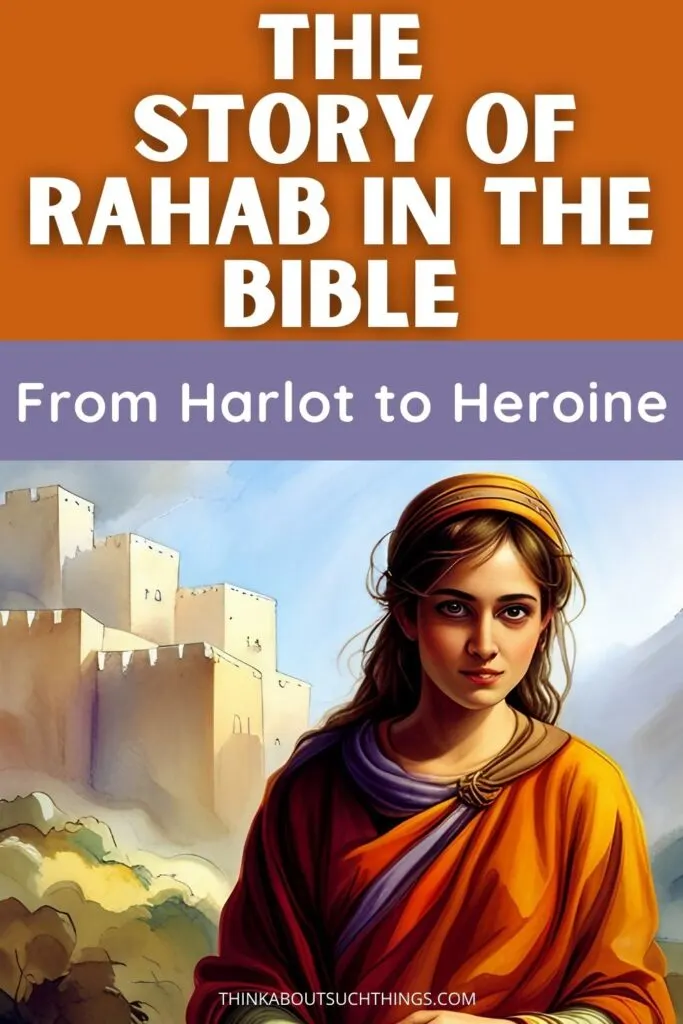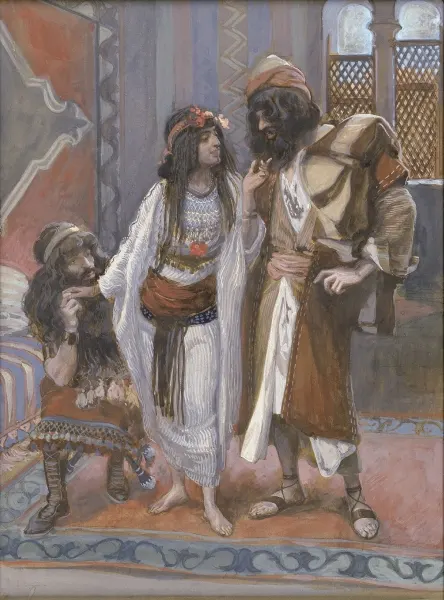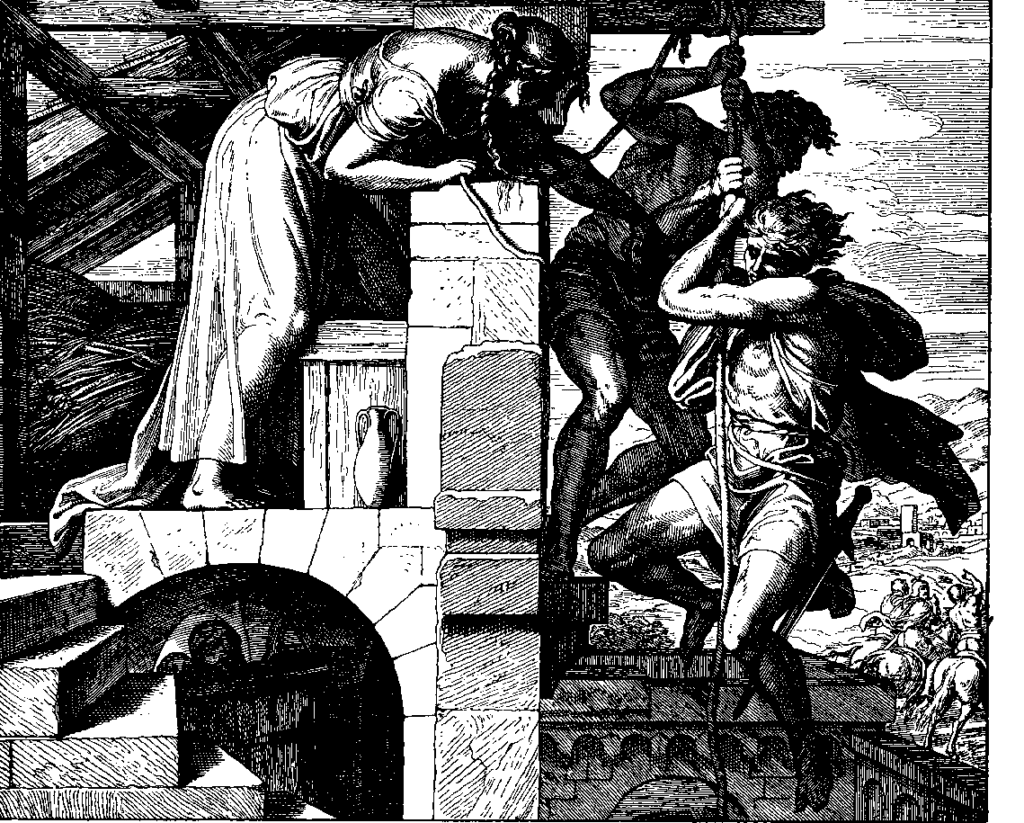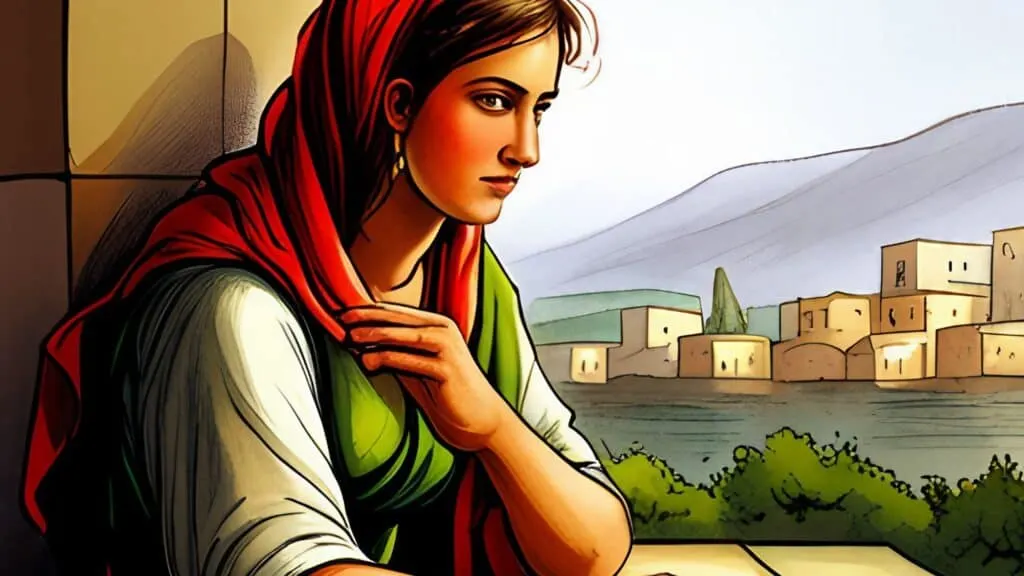In this article, we will look at the life and story of Rahab in the Bible. We explore what the Bible says about her and what we can learn. So, grab your Bible, and let’s dig in…
Have you ever heard that someone is called a bad apple or a busybody?
Perhaps you have called someone a know-it-all, or maybe you were called a slow poke when running.
Sometimes we label someone in jest, and other times the label defines our thinking and estimation of that person.
Name-calling is often unkind.
It focuses on one aspect of the person’s character while ignoring all other aspects. You may be a slow poke at running, but you are a brilliant software coder or a champion swimmer.
A label should not define you. Unfortunately, it often determines how others see you and your thoughts.
There is someone in the Bible that carries a label that could make us lose sight of her true value.
She was part of the miracle when the Israelites conquered the city of Jericho and a great example to each of us.

Who Was Rahab In The Bible?
We read about Rahab for the first time in the second chapter of Joshua. Rahab lived in Jericho when the Israelites were about to enter Canaan. She was a Canaanite, much like the Syrophonecian woman who begged Jesus for her daughter’s deliverance.
When Joshua sent spies into Jericho, they found refuge at Rahab’s lodgings.
In Joshua 2:1, Rahab is identified as a harlot. Being called a harlot has a different context to the Canaanite culture.
In Canaanite culture, being a harlot was not frowned upon as in Hebrew culture. Fertility festivals even formed part of their idol worship, especially for their false god, Asherah.
Some historical texts also describe Rahab as an innkeeper, and it is conceivable that she was both a harlot and an innkeeper. Her house in the city wall also allowed her to see strangers approaching the city.
Rahab would see travelers approach the city and advertise her accommodation or trade.
She heard stories from travelers that many other city dwellers would not hear. Rahab had her ear to the ground in a manner of speaking.
Regardless of Rahab’s past, her interaction with the spies changed her future.
Rahab Turned Her Back On Idols

Strangers coming to Rahab’s house should not have raised any eyebrows, but somehow the king of Jericho heard that Israelite spies were lodging at Rahab.
When the king told Rahab to give up the spies lodging in her house, she told a life-changing lie. She told the king’s messengers she did not know that the men were Israelite spies and that they had left the city just before dark.
Rahab had hidden the spies under piles of flax drying on her roof. Her lie could have cost her life if she had been found out.
What made this pagan woman lie to her king and save these foreigners?
She had been hearing stories about the God they served. Everyone in Canaan had heard how God had fought for the Israelites and given them victory over their adversaries.
God had been working on Rahab’s heart before the spies arrived because she had already contemplated His mighty works.
Rahab knew the idols she had grown up serving could not do mighty works like the God of Israel. Rahab recognized God as the God of heaven and earth.
Despite its strong walls, she knew God would destroy Jericho as He had done with the Egyptian army and Amorite king.
Rahab Showed Great Faith

Despite hearing the reports about how Israel had walked through the Red Sea without getting their feet wet, and had defeated two powerful kings, Rahab did not remain in fear like her countrymen.
Instead, Rahab wanted to follow the ways of the LORD, who performed these miracles.
Rahab did not see the miracles the Israelites did, yet she showed greater faith than many of the Israelites. She did not hesitate to turn her back on her past in order to secure her future.
She bargained for her life and the lives of her family, trusting that the spies would honor their word.
The same scarlet cord she lowered the spies down the wall with when she helped them escape became her own lifeline.
Just as the red blood of a lamb painted on the doorposts kept the Israelites safe from death in Egypt, this red cord kept Rahab and her family safe.
Rahab’s Faith Statement Prophesied Israel’s Victory
God can use anyone to do His works and show His wonders. Rahab is called a harlot throughout the Bible, yet she became so much more than that.
It is not where God finds you that matters. It is how willing you are to follow Him that makes the difference. The stories that made others cower became Rahab’s faith statement.
Rahab told the spies that God and the Israelites struck fear into the hearts of all her fellow countrymen, and she knew that God had given the land to the Israelites.

The spies had all the information they needed. When they left Jericho, they hid for three days as Rahab advised. They did not continue to spy out the country.
After three days, they returned to Joshua, and Rahab’s words were their prophetic report. The words of faith God laid on Rahab’s heart gave her the courage to turn her back on her pagan Gods.
The same words also encouraged Joshua and the nation that God would give them victory. In Joshua 6, we read how God gives Israel victory over Jericho and keeps the promise to Rahab and her family.
And Joshua saved Rahab the harlot alive, and her father’s household, and all that she had; and she dwelleth in Israel even unto this day; because she hid the messengers, which Joshua sent to spy out Jericho. – Joshua 6:25
However, this is not the last time we read about Rahab in the Bible. Rahab is also mentioned in the Books of Matthew, James, and Hebrews.
The first New Testament account of Rahab is when Matthew lays out the genealogy of Jesus. How could the spies have known they were paving the way for the Messiah’s birth?
How Is Rahab Related To Jesus?
Rahab became an ancestor of Jesus. This seems inconceivable, but our beginning does not determine our end. Matthew 1:5 tells us that Rahab (spelled Rehab in Greek) married Salmon.
Salmon the father of Boaz, whose mother was Rahab, Boaz the father of Obed, whose mother was Ruth, Obed the father of Jesse, – Matthew 1:5
They had a son called Boaz. We read the account of Boaz, who redeemed Naomi’s land and married Ruth the Moabite in the book of Ruth. Ruth is King David’s great-grandmother, and Jesus is born from this bloodline.
Rahab Put Her Faith Into Action
Rahab, like Ruth, was a woman who turned away from idol worship to change the history of Israel.
In fact, Rahab is mentioned in the Bible’s Faith Hall of Fame. Hebrews 11:31 explains how it is Rahab’s faith that saved her. Faith alone would not have helped her much.
We learn in James 2:14-26 how faith needs to lead to action in our lives. We cannot say we have faith and then cower in fear because of our situation. James states that faith that does not go over into action is dead.
We would not have read about her in the Bible if Rahab had just believed but had not helped the spies out of fear of her king. Rahab shows us how faith that results in action is strong and alive.
Rahab did not know the Torah, she did not know anything about the law, but she had heard about God and wanted to know more.
She left her past beliefs and occupation behind and converted to serve God. Rahab did not wait until she was converted to believe or put her faith into action.
God meets us wherever we are on our journey. God wants a relationship with us, regardless of our past.
We do not need to wait for God to complete His good work in us before He can use us. We just need to have faith and be obedient to His call.
If God can use a pagan harlot as a prophetess, He can also use each of us to do His bidding on the earth.
Not every act of faith needs to make history as Rahab did. Your act of faith may require you to give a stranger a word of encouragement or a loaf of bread.
We need to learn to act in faith, not by what we can see. Rahab could have given in to fear. We may fear rejection or being called weird when we are called to step out of our comfort zone. As Rahab showed us, that leap of faith may change your life.

Melissa is a passionate minister, speaker and an ongoing learner of the Bible. She has been involved in church and vocational ministry for over 18 years. And is the founder of Think About Such Things. She has the heart to equip the saints by helping them get into the Word of God and fall more in love with Jesus. She also enjoys family, cooking, and reading.
She has spoken in churches in California, Oregon, Texas, and Mexico and has been featured in Guidepost Magazine and All Recipes Magazine. Read More…
